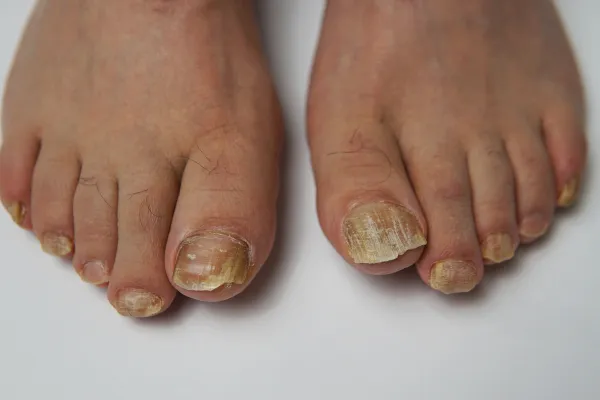Tips & Advice From West Haven Foot and Ankle Center

Why Are My Toenails Thick, Yellow, or Cracked?
Toenails Looking a Bit... Off?
If your toenails have become thick, yellow, brittle, or crumbly, you’re definitely not alone. It’s one of the most common things we see at our West Haven podiatry clinic—and most people wait way too long to get it checked.
Sometimes it starts with just a slight discoloration. Then one day, you notice your toenail looks thicker, harder to trim, or even painful in shoes.
So what’s going on? And how do you fix it?
Let’s break it down simply.
Common Causes of Thick or Discolored Toenails
While there can be a few different reasons your nails change, the most common causes include:
1. Fungal Toenail Infection (Onychomycosis)
This is the #1 reason we see changes like:
Yellow, brown, or white discoloration
Thickened nails
Nails that are brittle, crumbly, or lifting from the nail bed
Fungus loves warm, moist environments—like sweaty shoes, locker rooms, and public showers. Once it gets under the nail, it’s tough to treat without professional help.
2. Injury or Trauma
Ever stubbed your toe hard? Or dropped something on it? That pressure or damage can change how the nail grows—sometimes making it thick, misshapen, or discolored.
Even repeated micro-trauma from tight shoes can affect your nails over time.
3. Aging
As we get older, nails naturally thicken and may change color. That’s totally normal, but if your nails also hurt or look very different, it’s still worth getting checked out.
4. Underlying Conditions
Sometimes changes in your toenails are linked to:
Diabetes
Circulatory issues
Psoriasis
Other skin or immune conditions
That’s why having a podiatrist take a look is so important—we can help figure out what’s really going on.
Why It’s Best Not to Ignore Nail Changes
Thick or discolored nails don’t just look bad—they can actually lead to more serious issues, especially if you:
Have diabetes or poor circulation
Have trouble trimming them safely
Feel pain or pressure in your shoes
Are dealing with repeat infections
Some people even develop ingrown toenails or fungal spread to other toes or skin (like athlete’s foot).
How We Treat Problem Toenails at Our West Haven Podiatry Clinic
We’ve helped hundreds of patients restore healthier toenails, feel more confident, and reduce the risk of infection or further damage.
Here’s how we can help:
✅ Accurate Diagnosis
We’ll examine your nails and, if needed, take a small sample to confirm if fungus is present. That way, we can choose the best treatment.
💡 Treatment Options
Depending on what’s going on, we may recommend:
Topical antifungal medications (stronger than over-the-counter ones)
Oral antifungal pills (for more severe infections)
Laser therapy to target fungus without harming your skin
Regular nail trimming and care if the nails are thick or hard to cut
🧼 Prevention Tips
We’ll also walk you through how to:
Keep your feet clean and dry
Choose better socks and shoes
Avoid re-infection from shoes or shower floors
You Don’t Have to Live With Ugly Toenails
If your toenails are thick, yellow, or cracked—don’t just cover them up with polish or hope they’ll grow out. Let’s get to the root of the problem.
At West Haven Foot and Ankle Center, we’ll give your nails the care they need and help you feel better—whether that means treating a fungal infection, relieving pain, or just making it easier to care for your nails safely at home.
Ready to Feel Good About Your Feet Again?
Book an appointment today at our West Haven podiatry clinic. We’re here to help you get back to healthier, happier feet—starting with your nails.
Ask West Haven Foot and Ankle Center And Their Team
Fill in the form to request a call from our team. One of our team members will call you for FREE and answer any questions or concerns you may have about your condition
Where To Find West Haven Foot and Ankle Center

If you have any questions before scheduling an appointment or for general inquiries, please use the contact us button below. Our team will promptly reach out to assist you.
Opening Hours
Monday: 8am - 5pm
Tuesday: 8am - 5pm
Wednesday: Closed
Thursday: 8am - 5pm
Friday: 8am - 5pm
Saturday: Closed
Sunday: Closed

